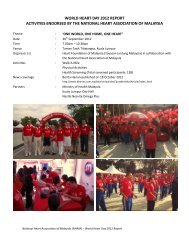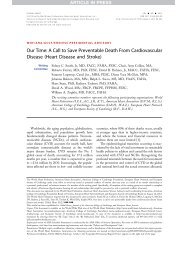Final Programme - World Heart Federation
Final Programme - World Heart Federation
Final Programme - World Heart Federation
Create successful ePaper yourself
Turn your PDF publications into a flip-book with our unique Google optimized e-Paper software.
Decompensated <strong>Heart</strong> Failure<br />
Faculty<br />
Nadine Clausell, MD, PhD (Co-Chair)<br />
Associate Professor of Medicine<br />
Federal University of Rio Grande do Sul<br />
Porto Alegre, RS, Brazil<br />
Sergio V. Perrone, MD (Co-Chair)<br />
Medical Director —<br />
Intrathoracic Transplant & <strong>Heart</strong> Failure Division<br />
FLENI Institute<br />
Buenos Aires, Argentina<br />
Uri Elkayam, MD<br />
Professor of Medicine<br />
University of Southern California,<br />
Keck School of Medicine<br />
Los Angeles, California<br />
J. Thomas Heywood, MD, FACC<br />
Clinical Professor of Medicine<br />
Loma Linda University School of Medicine<br />
Loma Linda, California<br />
Fábio Vilas-Boas, MD, PhD<br />
Chief Cardiology Division<br />
Hospital Espanhol<br />
Salvador, BA, Brazil<br />
Agenda<br />
17:30 – 18:00 Reception<br />
18:00 – 18:05 Introduction (Co-chairs)<br />
Nadine Clausell, MD, PhD<br />
Sergio Perrone, MD<br />
<strong>Programme</strong> Overview<br />
Organized by<br />
Acute decompensated heart failure (ADHF) is associated with<br />
prolonged in-hospital lengths of stay, high rates of hospital<br />
readmission, and substantial rates of inpatient and outpatient<br />
morbidity and mortality. In Latin American countries, the incidence of<br />
heart failure is rising, and ADHF has not been as well characterized as<br />
chronic heart failure. An awareness of unmet needs in ADHF<br />
management is therefore useful to improve the process of care in this<br />
patient population. Goals of therapy for ADHF include relieving<br />
symptoms, reversing acute hemodynamic abnormalities, initiating<br />
evidence-based therapy, reducing length of stay, and preventing<br />
rehospitalization. Treatment recommendations are generally based on<br />
the patient’s fluid volume status and cardiac output. It is therefore<br />
critical for cardiologists to be aware of when to use various intravenous<br />
therapies for improving hemodynamics and acute heart failure signs<br />
and symptoms. One such agent is the vasodilator nesiritide, a purified<br />
preparation of human B-type natriuretic peptide (hBNP), which<br />
reduces pulmonary capillary wedge pressure and improves dyspnea in<br />
patients with ADHF who have dyspnea at rest or with minimal activity.<br />
This program will help Latin American cardiologists understand the<br />
challenges in managing ADHF and effective therapeutic strategies for<br />
treating patients with different hemodynamic and clinical profiles. In<br />
addition, faculty members will describe and demonstrate through case<br />
presentation the appropriate use of nesiritide in patients with ADHF.<br />
18:05 – 18:15 Focus on Latin America:<br />
Unmet Needs in Acute Decompensated <strong>Heart</strong> Failure Management<br />
Nadine Clausell, MD, PhD<br />
18:15 – 18:35 Current Treatment Options for Acute Decompensated <strong>Heart</strong> Failure<br />
Uri Elkayam, MD<br />
18:35 – 18:55 Nesiritide Therapy for the ADHF Patient<br />
J. Thomas Heywood, MD<br />
18:55 – 19:15 Case Presentation and Panel Discussion<br />
Moderator: Uri Elkayam, MD<br />
Panelists: Nadine Clausell, MD, PhD, Sergio Perrone, MD, Fábio Vilas-Boas, MD, PhD,<br />
J. Thomas Heywood, MD<br />
19:15 – 19:30 Question and Answer





